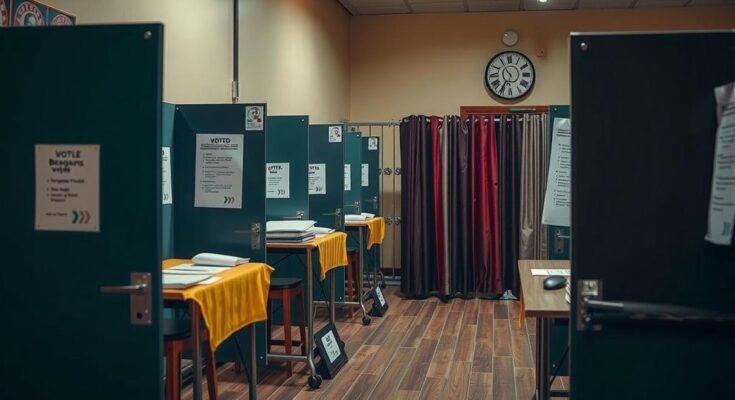Namibia has extended voting until Saturday due to issues encountered in the recent elections marked by technical failures and long waiting times. With criticisms from opposition parties and concerns from the electorate, the ruling SWAPO faces a challenging environment as it seeks to retain power amidst rising discontent and socio-economic challenges.
Namibia has reopened voting in 36 polling stations following significant disruptions during Wednesday’s parliamentary and presidential elections, which were characterized by severe delays and technical malfunctions. The extended voting period aims to allow citizens whose participation was hindered by these issues to make their voices heard. The elections, deemed particularly challenging for the ruling South West Africa People’s Organisation (SWAPO), have led to mounting tensions as opposition parties express dissatisfaction with the process and call for reforms.
The election chaos was chiefly due to malfunctioning registration tablets, a lack of ballot papers, and inadequate resources like depleted batteries for essential equipment. As a result, many citizens faced hours-long waits to cast their votes. In an attempt to mitigate further discontent among voters, the electoral commission decided to extend the voting period until Saturday evening. In Windhoek, only a single polling station was reopened, creating concerns among residents that such an arrangement could lead to overcrowding and additional frustration.
Criticism from the opposition regarding the electoral procedure has intensified, particularly in light of the expectations for a smooth democratic process. Young voters, like Kluivert Muuondjo, have expressed hopes that more citizens will be afforded the opportunity to vote despite the logistical challenges. The opposition, including the Independent Patriots for Change (IPC) party, plans to convene to address the election’s issues and may issue a collaborative statement regarding the unfolding situation.
The ruling SWAPO, in power since Namibia gained independence from South Africa in 1990, faces increasing pressure as youth unemployment and social inequalities rise. Netumbo Nandi-Ndaitwah’s candidacy for the presidency reflects potential changes in leadership dynamics, as she could potentially become the first female president. However, the disarray witnessed during the elections raises concerns about the electorate’s confidence in the electoral process going forward.
Namibia has a history of peaceful elections since its independence in 1990. The SWAPO party, which has been dominant since then, is facing heightened scrutiny and dissatisfaction among voters, particularly the younger demographic. The recent election’s technical problems have sparked renewed concerns about the integrity and accessibility of the electoral process, raising questions regarding the legitimacy of SWAPO’s continued leadership. The Governor of Khomas, where Windhoek is located, represents a pivotal area for the ruling party. The socio-economic landscape in Namibia has shifted, with issues such as youth unemployment and social inequalities complicating the political climate, particularly with a generation that has grown up post-independence, showing signs of discontent with SWAPO’s performance.
In summary, Namibia’s recent elections have unveiled significant operational challenges and public discontent, particularly among younger voters and opposition parties. The electoral commission’s decision to extend voting time illustrates an acknowledgment of these issues, yet questions remain regarding the overall fairness and integrity of the electoral process. As SWAPO seeks to maintain its governing position, these complications may influence public perception and electoral support moving forward.
Original Source: www.zimlive.com




